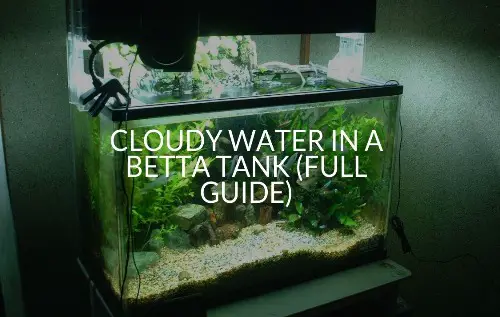Originally posted on May 17, 2023 @ 2:00 pm
Last Updated on 3 months by admin
Are you tired of looking at cloudy water in your Betta fish tank? As a Betta fish owner, it can be frustrating to see your fish swimming in murky water. Cloudy water is a common problem that Betta fish owners face, and it can be caused by a multitude of factors. But don’t worry, troubleshooting cloudy water in your Betta fish tank is easy with the right knowledge and tools. In this article, we will discuss the common causes of cloudy water in Betta fish tanks and provide solutions to help you keep your tank clean and clear for your beloved pet. Let’s dive in!

Troubleshooting Cloudy Water in Your Betta Fish Tank
Betta fish are one of the most popular aquarium pets around the world. With their stunning colors and fascinating personalities, they make for great companions. However, it’s important to keep their environment clean and healthy to ensure their well-being. Cloudy water is a common issue that betta fish owners face, and it can be caused by several factors. In this article, we’ll look at some of the most common reasons for cloudy water and how to troubleshoot them.
Overfeeding
Overfeeding is one of the most common reasons for cloudy water in betta fish tanks. When you feed your fish too much, the uneaten food can settle at the bottom of the tank and begin to decompose. This decomposition process produces ammonia, which can cause the water to turn cloudy. Besides, overfeeding can cause other health problems for your betta fish, such as constipation, bloating, and swim bladder issues.
To avoid overfeeding, make sure to feed your betta fish only as much as they can eat in two minutes. You can also implement a feeding schedule to ensure that you’re not giving them too much food. If you notice any uneaten food in the tank, remove it immediately with a siphon or net.
Inadequate Filtration
A good filtration system is essential to keep your betta fish tank clean and healthy. Without proper filtration, waste products such as uneaten food, fish waste, and plant debris can accumulate in the tank and cause cloudiness. A filter helps to remove these impurities from the water, keeping it clear and clean.
If you’re experiencing cloudy water in your betta fish tank, check your filter to make sure it’s functioning correctly. If it’s not, clean or replace the filter media according to the manufacturer’s instructions. Also, make sure that the filter is appropriate for the size of your tank. A filter that’s too small for your tank won’t be effective in removing impurities.
Poor Water Quality
Another common cause of cloudy water in betta fish tanks is poor water quality. Water quality can be affected by several factors, including high levels of ammonia, nitrite, and nitrate. These compounds can build up in the tank and cause the water to turn cloudy.
To maintain good water quality, perform regular water changes. You should change 25% of the tank water every week to remove any accumulated waste and impurities. Also, test the water regularly using a water test kit to monitor levels of ammonia, nitrite, and nitrate. If the levels are too high, perform more frequent water changes until they are within the safe range.
Presence of Algae
Algae growth is another common cause of cloudy water in betta fish tanks. Algae can grow quickly in warm, well-lit environments, and can turn the water green or brown. Besides, algae can consume oxygen and produce carbon dioxide, which can be harmful to your fish.
To prevent algae growth, reduce the amount of light your tank receives, and limit the amount of time your tank light is on. Also, make sure to perform regular water changes and clean your tank regularly. If algae growth is severe, you can use an algae scraper or a chemical treatment to remove it.
Presence of Bacteria
Bacteria can also cause cloudy water in betta fish tanks. Bacteria can grow when there’s an abundance of organic matter in the tank, such as uneaten food and fish waste. Besides, bacteria can cause several health problems for your fish, such as fin rot, swim bladder disease, and bacterial infections.
To prevent bacteria growth, make sure to clean your tank regularly and remove any uneaten food or debris. You can also add beneficial bacteria to your tank to help break down waste products and maintain water quality. Beneficial bacteria can be found in commercial products such as bacterial supplements or live plants.
Conclusion
Cloudy water can be a frustrating problem for betta fish owners, but it can be solved with proper troubleshooting. By identifying the cause of the cloudiness and taking appropriate action, you can keep your betta fish tank clean and healthy. Remember to feed your fish only what they need, maintain adequate filtration, perform regular water changes, and keep your tank clean. By following these simple steps, you can ensure a clear and healthy environment for your betta fish.
Frequently Asked Questions
Q: Why is my betta fish tank water cloudy?
Cloudy water in your betta fish tank can be caused by a number of reasons. The most common reasons are overfeeding, overstocking, and poor filtration. Overfeeding your betta fish can cause uneaten food to accumulate in the tank, which can lead to bacterial growth and cloudy water. Overstocking the tank can also lead to an overload of waste and debris, which can cause the water to become cloudy. Poor filtration can also contribute to cloudy water, as it is not able to efficiently remove waste and debris from the water.
To troubleshoot cloudy water in your betta fish tank, start by examining your feeding habits and reducing the amount of food you are giving your fish. Consider upgrading your filtration system or adding a secondary filter to the tank. Lastly, make sure you are not overstocking the tank and perform regular water changes to help remove any excess waste and debris.
Q: What can I do to prevent cloudy water in my betta fish tank?
Preventing cloudy water in your betta fish tank is all about maintaining a clean and healthy environment for your fish. This means regularly cleaning the tank, performing water changes, and ensuring that the tank is not overstocked. You should also avoid overfeeding your fish and consider using a high-quality filtration system that is appropriate for the size of your tank.
In addition to these measures, you can also consider adding live plants to the tank, which can help to absorb excess nutrients and waste from the water. Finally, make sure that you are using high-quality water that is free from contaminants and chemicals, as this can also contribute to cloudy water in your betta fish tank.
Q: How often should I change the water in my betta fish tank?
The frequency of water changes in your betta fish tank will depend on a number of factors, including the size of the tank, the number of fish, and the quality of the water. In general, it is recommended that you perform a partial water change of around 20-30% every week to help maintain a healthy environment for your fish.
If you notice that the water in your tank is becoming cloudy or discolored, you may need to perform more frequent water changes or increase the amount of water you are changing each time. You should also perform a complete water change every 4-6 weeks to help remove any accumulated waste and debris from the tank.
Q: Can I use chemicals to treat cloudy water in my betta fish tank?
While there are a number of chemicals available that claim to treat cloudy water in fish tanks, it is generally not recommended to use them. These chemicals can be harsh and may harm your fish, and they also do not address the underlying causes of cloudy water in the tank.
Instead of using chemicals, it is best to troubleshoot the issue and address any underlying factors that may be contributing to the cloudiness. This may involve adjusting your feeding habits, upgrading your filtration system, or performing more frequent water changes.
Q: Is cloudy water harmful to my betta fish?
Cloudy water in your betta fish tank can be a sign of an unhealthy environment, but it is not necessarily harmful to your fish. However, if left untreated, cloudy water can lead to a buildup of harmful bacteria and toxins in the tank, which can be harmful to your fish.
To ensure the health and wellbeing of your betta fish, it is important to address any issues with cloudy water as soon as possible. This may involve troubleshooting the issue and performing more frequent water changes, or upgrading your filtration system to more effectively remove waste and debris from the water.

Why Is My Betta Fishbowl Cloudy?
In conclusion, cloudy water in your betta fish tank is a common problem that can be easily solved with proper care and maintenance. By following the steps outlined in this article, you can keep your betta fish healthy and happy in a clean and clear environment.
Firstly, it is important to identify the cause of the cloudy water, whether it be overfeeding, a dirty filter, or poor water quality. Once the cause has been identified, take steps to address it, such as reducing the amount of food given, cleaning the filter, or doing regular water changes.
Secondly, prevention is key to avoiding cloudy water in the first place. Make sure to properly cycle your tank, avoid overfeeding, and do regular water changes to maintain a healthy environment for your betta fish.
Lastly, if the problem persists or your betta fish shows signs of illness, consult with a veterinarian or experienced fish keeper for additional advice and treatment options. With the proper care and attention, you can enjoy a clear and beautiful betta fish tank for years to come.
